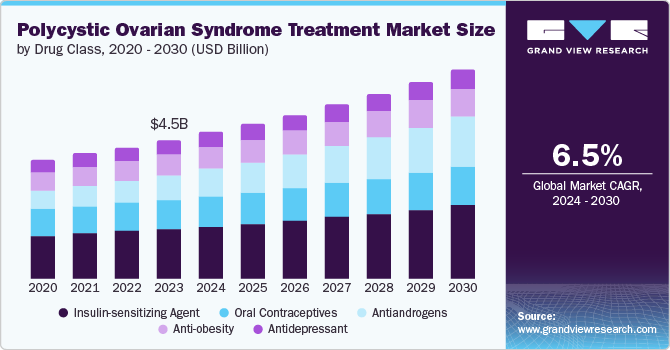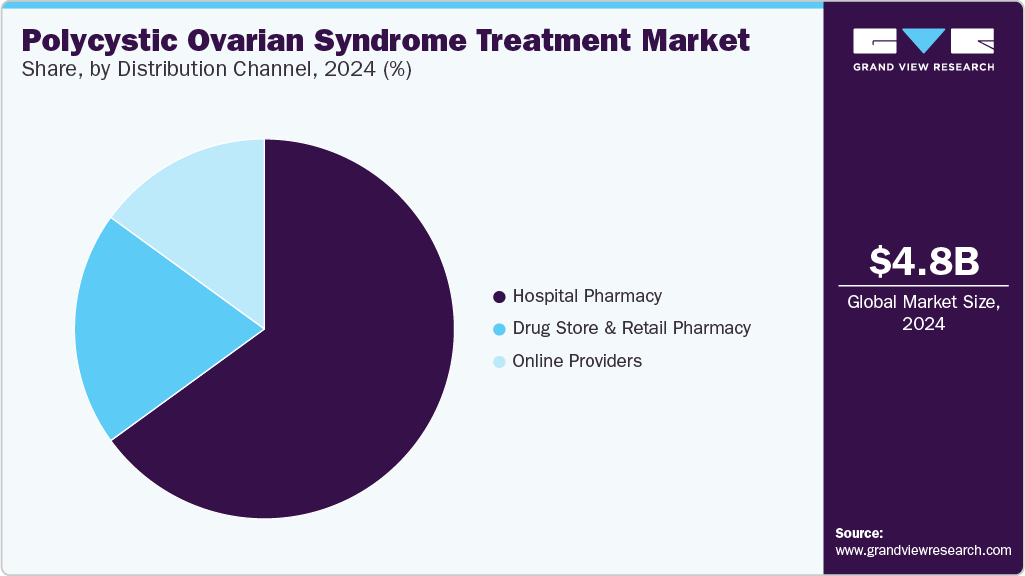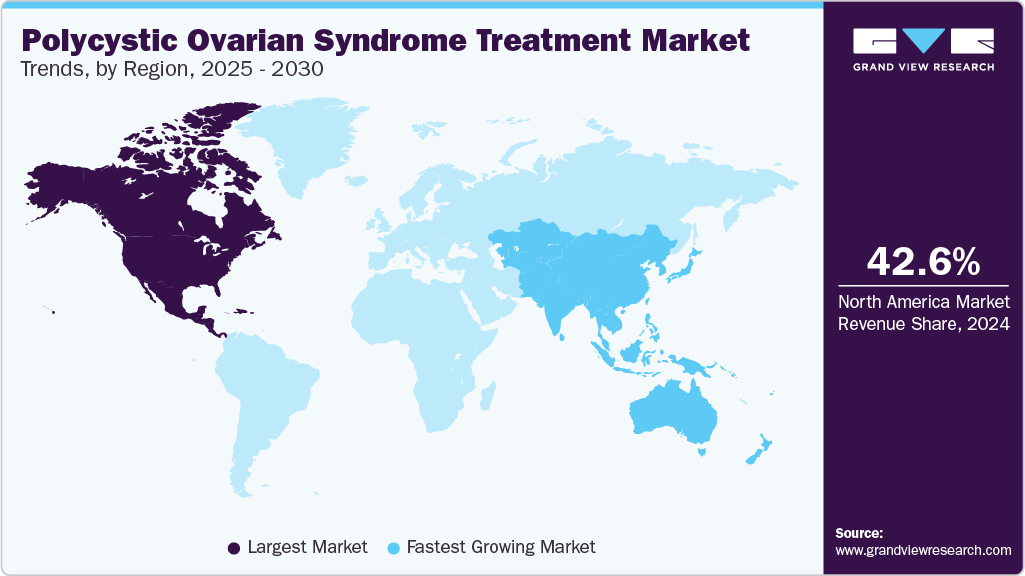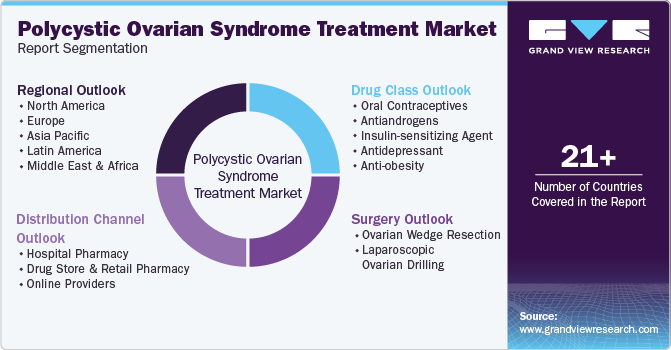- Home
- »
- Pharmaceuticals
- »
-
Polycystic Ovarian Syndrome Treatment Market Report, 2030GVR Report cover
![Polycystic Ovarian Syndrome Treatment Market Size, Share & Trends Report]()
Polycystic Ovarian Syndrome Treatment Market Size, Share & Trends Analysis Report By Drug Class (Oral Contraceptives, Antiandrogens), By Surgery, By Distribution Channel, By Region, And Segment Forecasts, 2024 - 2030
- Report ID: GVR-2-68038-203-7
- Number of Report Pages: 100
- Format: PDF, Horizon Databook
- Historical Range: 2018 - 2022
- Forecast Period: 2024 - 2030
- Industry: Healthcare
Market Size & Trends
The global polycystic ovarian syndrome treatment market size was valued at USD 4.53 billion in 2023 and is projected to grow at a CAGR of 6.5% from 2024 to 2030. The growth rate is attributed to lifestyle changes, indulgence in alcohol, rising incidences of depression and stress, and hormonal imbalance. According to the information published by the World Health Organization (WHO) in June 2023, PCOS affects 8-13% of reproductive-aged women and about 70% of affected women remain undiagnosed globally.

The prevalence of diabetes is growing in polycystic ovarian syndrome cases. According to the World Health Organization (WHO), women with a type 2 diabetes family history are at a higher risk of polycystic ovarian syndrome. In addition, the Centers for Disease Control and Prevention (CDC) stated that people suffering from the condition are unable to produce insulin, an essential hormone to balance blood sugar, resulting in insulin resistance, leading to type 2 diabetes. Such rising chronic diseases are expected to drive the treatment market growth.
Obesity is another driving factor that causes polycystic ovarian syndrome. According to the World Health Organization (WHO), 2.5 billion adults were overweight in 2022, of which 44% were women. The people affected with this condition were also suffering from obesity, and with weight gain, the PCOS condition developed as per the endocrine center. The rise in such health conditions and the increase in polycystic ovarian syndrome cases results in market growth.
Drug Class Insights
Insulin-sensitizing agents dominated the market and accounted for a share of 36.2% in 2023. Patients affected by PCOS tend to have diabetes issues due to insulin resistance, leading to type 2 diabetes. The insulin-sensitizing agents regulate the insulin and maintain healthy blood sugar levels. For instance, metformin is a commonly used insulin-sensitizing medicine among patients affected with PCOS to induce ovulation in infertile women. In addition, according to the Frontiers study published in January 2023, resveratrol (RES) was seen to regulate insulin resistance in PCOS patients by improving the glycolytic pathway and providing effective treatment.
Oral contraceptives are expected to register the fastest CAGR over the forecast period. Oral contraceptive pills can be used to mitigate the symptoms of PCOS. The birth-control type used to treat PCOS is combined hormonal birth control pills, as they may regulate menstrual bleeding and reduce excessive hair growth associated with the syndrome. Some oral contraceptive pills used to treat the syndrome are clomiphene combined with metformin and Letrozole to treat the condition and the issue of infertility among women suffering from the syndrome. Some key players producing these contraceptives are Avet Pharmaceuticals Inc., Breckenridge Pharmaceutical, Inc., Seqens, and SUANFARMA.
Surgery Insights
Laparoscopic ovarian drilling accounted for the largest market revenue share of 68.7% in 2023. It is a surgical treatment for PCOS, which can help with ovulation. The surgical alternative is opted when the drug therapy proves ineffective, where the patient cannot ovulate despite weight loss and usage of fertility medicine. The hospitals and clinics performing the surgery are CommonSpirit Health, Ethos Health Care, NEO Fertility Treatment, Mayo Foundation for Medical Education and Research (Mayo Clinic), and Endometriosis Clinic.
Ovarian wedge resection is the second fastest-growing segment, significantly growing during the forecast period. The resection procedure is used to treat PCOS, which may regulate the menstrual cycle and promote ovulation. The post-surgery results saw a significant decrease in testosterone levels, improved insulin levels, and a normal menstrual cycle.
Distribution Channel Insights
The hospital pharmacy segment accounted for the largest market revenue share of 65.0% in 2023. The growing incidences of the syndrome and the demand for oral contraceptives are driving the segment growth. Surgery to treat the syndrome can be performed only at clinics and hospitals; therefore, they have in-house pharmacies to provide the required medical assistance.

Online providers are expected to register the fastest CAGR during the forecast period. Various online portals are available where healthcare professionals can consult patients for treatment. Oral contraceptive orders can be placed in online pharmacies to avoid hesitations among women. Online healthcare portals such as Uvi Health provide online consultations in case of emergencies or severe pain when the patient is unable to visit the clinic or hospital. Some online platforms offering PCOS consultations are Allara Health, TalktoAngel, Practo, and PlushCare. Such technological innovations are driving the segment growth.
Regional Insights
North America’s polycystic ovarian syndrome treatment market dominated in 2023. According to a study published by ScienceDirect in 2024, North America spends nearly USD 4 billion on polycystic ovarian syndrome and related diseases. In addition, menstrual irregularities were seen in 22.8% of patients. According to the Alberta women’s health foundation report published in February 2023, nearly 1.4 million women in Canada may be affected by PCOS. The companies are engaged in research to discover new treatment alternatives and reduce increased prevalence of PCOS. The key players involved in the market include Abbott, Bristol Myers Squibb Company, and Pfizer, Inc.
U.S. Polycystic Ovarian Syndrome Treatment Market Trends
The U.S. polycystic ovarian syndrome treatmentmarket accounted for a 38.0% share of the global market in 2023. According to the Endocrine Society report published in January 2022, nearly 5 to 6 million women in U.S. are affected with PCOS. Companies are involved in innovating treatment alternatives such as innovative controlled ovarian stimulation (COS) which was developed in 2021 to treat PCOS. The UCSF PCOS clinic is developed to focus on creating an integrated approach to treat polycystic ovarian syndrome. Key players such as Abbott, Pfizer, Inc., and Bristol Myers Squibb Company are involved in driving the market growth.
Europe Polycystic Ovarian Syndrome Treatment Market Trends
Europe accounted for a significant market share in 2023 in the polycystic ovarian syndrome treatment market. According to the report published by The Lancet in October 2022, polycystic ovarian syndrome cases are recorded at approximately 276.4 cases per 100,000 people in the European region. The European Union (EU) is taking initiatives such as SPIOMET4Health to provide treatment for the syndrome in September 2022. Many organizations are participating in this EU project, such as Make Mothers Matter (MMM) organization. Such initiatives are expected to drive market growth.

In the UK, one in five women is affected by polycystic ovarian syndrome, according to the London Women’s Centre organization. The NHS England is joining forces with the National Institute for Health and Care Excellence (NICE) and the Medicines and Healthcare products Regulatory Agency (MHRA) through the Accelerated Access Collaboration to pick a pace for accessing technologies proven safe and effective for the patients. For instance, women with PCOS condition are likely to develop metabolic syndrome, which may lead to diabetes; the NHS Diabetes Prevention programme is established to identify patients at high risk of developing the chronic diseases and refer them to a 9-month lifestyle change programme. Such initiatives are expected to drive market growth in the region.
Asia Pacific Polycystic Ovarian Syndrome Treatment Market Trends
Asia Pacific’s polycystic ovarian syndrome treatment market is estimated to register the fastest CAGR over the forecast period. Polycystic ovarian condition affects nearly 25% of women in Australia, according to The Endocrine Society of Australia. The Australian government is taking initiatives such as forming international guideline in August 2023 to improve the PCOS condition among women, as it is the leading cause of infertility. This guideline is led by the Monash Centre for Health Research and Implementation (MCHRI) at Monash University based in Australia.
The rising prevalence of the condition in India is the major driving factor for the region’s market growth. According to the Press Information Bureau (PIB) of the Indian government report published in January 2023, the PCOS cases in the nation range from 3.7- 22.5% and are the major cause of female infertility, estimated 64%. To address this issue, the Indian Council of Medical Research (ICMR), initiated a multicentric study nationwide in 2021. Some medical drugs available in the country to treat PCOS are Follical Forte Tablets, PCOS Care Capsules, Ferjoy-IN Tablets to treat hormonal imbalances, and Cureveda Women Elixir to provide relief from the symptoms. Such increasing incidences, initiatives, and companies innovating new drugs are driving the market growth.
According to the AME report published in January 2021; polycystic ovarian syndrome is increasing in Chinese women; the polycystic ovarian syndrome is increasing in Chinese women. As study published by ScienceDirect in September 2023, verified the efficacy and safety of Chinese patented medicine Xiao Yao San (XYS) to treat PCOS, and results showed that XYS combined with conventional medicines can improve ovulation and fertility rates.
Key Polycystic Ovarian Syndrome Treatment Company Insights
Some key companies in polycystic ovarian syndrome treatment include, - AstraZeneca, Bayer AG, Merck KGaA, Pfizer, Inc, Teva Pharmaceutical Industries Ltd, Abbott. Key companies are involved in taking strategic initiatives such as in innovating new products, collaborating with institutions and other industries and establishing partnerships.
-
Bayer AG is a global life science company with core competencies in healthcare. The company manufactures medicinal products such as aspirin, antibiotics, anti-infectives, and cardiovascular and oncology medications. Bayer AG is involved in forming strategic initiatives and collaborations to innovate medication to treat PCOS.
-
Teva Pharmaceutical Industries Ltd is an Israel based pharmaceutical company specializing in generic drugs, active pharmaceutical ingredients and contract manufacturing services. The company has an array of drugs such as Ovaleap, and Seasonique to treat fertility, and related disorders.
Key Polycystic Ovarian Syndrome Treatment Companies:
The following are the leading companies in the polycystic ovarian syndrome treatment market. These companies collectively hold the largest market share and dictate industry trends.
- AstraZeneca
- Bayer AG
- Merck KGaA
- Abbott
- Pfizer, Inc
- Sanofi
- Bristol Myers Squibb Company
- Teva Pharmaceutical Industries Ltd
- Novartis AG
- Ferring B.V.
Recent Developments
-
In January 2022, Evotec-partnered biotechnology company Celmatix Inc. announced its third milestone for the PCOS drug program in its five-year multi-target alliance.
-
In December 2021, Organon Group, a global women’s healthcare company, acquired Forendo Pharma to expand its pipeline of products targeting endometriosis and polycystic ovarian syndrome (PCOS).
Polycystic Ovarian Syndrome Treatment Market Report Scope
Report Attribute
Details
Market size value in 2024
USD 4.79 billion
Revenue forecast in 2030
USD 6.99 billion
Growth rate
CAGR of 6.5% from 2024 to 2030
Base year for estimation
2023
Historical data
2018 - 2022
Forecast period
2024 - 2030
Report updated
August 2024
Quantitative units
Revenue in USD billion and CAGR from 2024 to 2030
Report coverage
Revenue forecast, company ranking, competitive landscape, growth factors, and trends
Segments covered
Drug class, surgery, distribution channel, region
Regional scope
North America, Europe, Asia Pacific, Latin America, MEA
Country scope
U.S., Canada, Mexico, Germany, UK, France, China, Japan, India, Australia, Brazil, KSA, UAE, South Africa
Key companies profiled
AstraZeneca, Bayer AG, Merck KGaA, Abbott, Pfizer, Inc, Sanofi, Bristol Myers Squibb Company, Teva Pharmaceutical Industries Ltd, Novartis AG, Ferring B.V.
Customization scope
Free report customization (equivalent up to 8 analysts working days) with purchase. Addition or alteration to country, regional & segment scope.
Pricing and purchase options
Avail customized purchase options to meet your exact research needs. Explore purchase options
Global Polycystic Ovarian Syndrome Treatment Market Report Segmentation
This report forecasts revenue growth at global, regional, and country levels and provides an analysis of the latest industry trends in each of the sub-segments from 2018 to 2030. For this study, Grand View Research has segmented the global polycystic ovarian syndrome treatment market report based on Drug class, surgery, distribution channel, region.

-
Drug Class Outlook (Revenue, USD Billion, 2018 - 2030)
-
Oral Contraceptives
-
Antiandrogens
-
Insulin-sensitizing Agent
-
Antidepressant
-
Anti-obesity
-
-
Surgery Outlook (Revenue, USD Billion, 2018 - 2030)
-
Ovarian Wedge Resection
-
Laparoscopic Ovarian Drilling
-
-
Distribution Channel Outlook (Revenue, USD Billion, 2018 - 2030)
-
Hospital Pharmacy
-
Drug Store & Retail Pharmacy
-
Online Providers
-
-
Regional Outlook (Revenue, USD Billion, 2018 - 2030)
-
North America
-
U.S.
-
Canada
-
Mexico
-
-
Europe
-
Germany
-
UK
-
France
-
-
Asia Pacific
-
China
-
Japan
-
India
-
South Korea
-
Australia
-
-
Latin America
-
Brazil
-
-
Middle East and Africa (MEA)
-
KSA
-
UAE
-
South Africa
-
-
Share this report with your colleague or friend.
![gvr icn]()
NEED A CUSTOM REPORT?
We can customize every report - free of charge - including purchasing stand-alone sections or country-level reports, as well as offer affordable discounts for start-ups & universities. Contact us now
![Certified Icon]()
We are GDPR and CCPA compliant! Your transaction & personal information is safe and secure. For more details, please read our privacy policy.
We are committed towards customer satisfaction, and quality service.
"The quality of research they have done for us has been excellent."





